November-December 2007
Our Cover Story
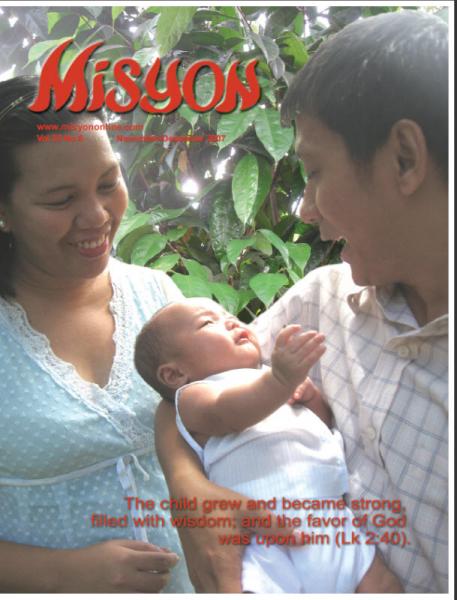
After patiently waiting, Renante and Christine Alejo-Uy are finally blessed with Kiefer Thomas, their first born. They are active members of Couples for Christ in Bacolod City.
A Child Asks For A Star
Poem by Sister M. Madaleva Wolff CSC
You quiet, wise,
wondering-men who know and love
the skies,
you who can make a jet, a satellite
with formulas to guide you and
compel you, make me a star
greater than all the
world’s piled up
munitions are.
Put in it all these things that I
shall tell you.
Put in a sorry innkeeper’s gruff
word, unsaid,
a small, straw bed
against the winter night;
a shepherd’s crook, and
since you once were little as I am,
put in a lamb,
three crowns for three great kings,
some homely simple things,
toys for our small world’s
girls and boys.
You have not made a star
like this before,
but there is nothing, nothing that all
men are seeking more.
Sky-lovers,
make the best star you can make
for a Child’s sake.
Used with permission of the Sisters of the Holy Cross, Saint Mary’s, Notre Dame, IN 46556, USA. Originally published by Dimension Books.
Sr Madeleva Wolff CSC was a leader in speaking on behalf of the education of women. She served as President of Saint Mary’s College, Notre Dame, IN, from 1934 to1961 and initiated a graduate degree program in Theology for women, the first such in the USA. Anticipating the ‘women’s movement’ of the late 1960s and the reforms of Vatican II by more than a generation, Sister Madeleva was an advocate for the improvement of the status of women in the Church. She was a renowned scholar, mystical poet, and author of more than twenty books. She died in 1964.
A Letter To My Brother Kokong
LIFESTORY
 Kuya, it has been a heart-rending decision to write this, not just to open my heart and let you know the turmoil going on inside, but because of love. So out of the cry of my spirit I bring it into the open, my heart imploring, readers empathizing, and my pen testifying. I thank the Holy Spirit for giving me this venue provided by Misyon where I can open up, since you shut your door to us.
Kuya, it has been a heart-rending decision to write this, not just to open my heart and let you know the turmoil going on inside, but because of love. So out of the cry of my spirit I bring it into the open, my heart imploring, readers empathizing, and my pen testifying. I thank the Holy Spirit for giving me this venue provided by Misyon where I can open up, since you shut your door to us.
There is this struggle on where and how to begin, compounded by a welling-up inside of me, that my pen must patiently write down, notwithstanding the premature tears that have already formed in the corner of my eyes.
Yes, all this started because you turned away from God, from love, from us. It was way back in 1995 that you began to change. You were an accomplished seaman then, on your way to reaching your higher goals. Sadly though, it also went to your head. You thought you were invincible, a man of the world, so confident that you even scorned death. In your pride you became a law unto yourself (Habakkuk 1:7). We watched helplessly as you ignored us, our parents heaving sighs of despair over your stubbornness. And the gun.
Yes, the gun. This thing that turns you on turned you in. Court, jail, homicide, bail. Love. A sudden twist? No, I cannot add love to the list. Love is unto itself only, second to none. It is as it is, in the same sense as when the Lord said, ‘I Am who I Am’ (Exodus 3:14). So what am I driving at? Love was there before your life began, was there when you hit rock bottom, and, with tears brimming in my eyes now, will be there in the end though we may never know what tomorrow may bring. Kuya, Love is all-encompassing, you can never contain It. Whatever your doubts may be about it, Love nevertheless does not have any doubts about you. It is waiting so patiently for you to come around and recognize its embrace.
Year 2007. Ten years. We are still waiting. You claim that you are different now, but sadly what you do seems only ritualistic. The prayers and devotions you do, have they really gotten to your heart? Every year you go to Cebu City to renew your devotion to the Blessed Sto Niño. Tell me, did you go through all those heavily packed ships and hours of standing in line only to set aside the holy encounter as soon as you got home, if not totally forgetting the spiritual graces you received? Were they done merely to placate God? No, I refuse to believe this. For I could see that you are sincerely supplicating God, only that you have not been patient.
 Kuya, God cannot be mocked. God cannot be tested. Neither can we hastily pray to Him. We cannot be ambivalent in our faith. I say ‘we’ for all of us are struggling followers of Christ and guilty of the same weakness. Perhaps, like a vessel where you might have simply dumped your prayers and supplications, filling it with all your cries, thinking that when it is full to the brim, God must surely be forced to answer. Sometimes in our agony we are tempted to ‘blackmail’ God with our long list of prayers said and Masses offered.
Kuya, God cannot be mocked. God cannot be tested. Neither can we hastily pray to Him. We cannot be ambivalent in our faith. I say ‘we’ for all of us are struggling followers of Christ and guilty of the same weakness. Perhaps, like a vessel where you might have simply dumped your prayers and supplications, filling it with all your cries, thinking that when it is full to the brim, God must surely be forced to answer. Sometimes in our agony we are tempted to ‘blackmail’ God with our long list of prayers said and Masses offered.
Kuya, please let me remind you that God can wait forever, for what are days and years to Him (Ps 90:4)? You have been impatient all these years, betraying such impatience in your drunkenness as you shout invectives. And that identity you sadly hold on to – let go of it. It is no longer yours. What is the use of a long-dried up laurel wreath that crumbles to pieces with each pathetic wave of your hand?
And now, a gun again. Was God’s first bitter lesson not enough for you? Up to what extent must you stretch His Divine and Holy Patience? I fear for you, my heart bleeds for you, my dear only brother. When will your stubbornness end? But love will not give up on you. We love you. Always. Simple. Must we quantify and qualify that? But neither can we turn a blind eye to what you are doing, destroying yourself again.
Rebuke you? Yes, and that is a resounding yes, for we can still give you our love and support without turning a blind eye to justice. Time and time again we have eaten our words, swearing not to be there when you get into trouble, yet we are there upon hearing your cry from behind bars. Is love like that? Well, is God like that? My answer is yes, God and love are like that, to a depth that can never be fathomed.
Kuya, love endures forever. To love you unto the end is better than to shed tears of regret over your dead body. We are not striving for any crown, but only that the longing we feel for you might be satisfied while still here on earth. My dear brother, have I said enough? Does this letter cause you so much pain and humiliation that you shout right through my ear:‘Enough!’?
Have I said what must be said? There is a lot more to say but there isn’t enough paper to document it all. But my assurance lies in my faith that words left unsaid have been written in the vastness of God’s heart. For didn’t God repeatedly whisper them into your ears way before this letter, but you just wouldn’t listen?
Kuya, please come back. We love you so much.
The author’s name and address are with us.
A Tale Of Two Christmases
By Christopher Ong
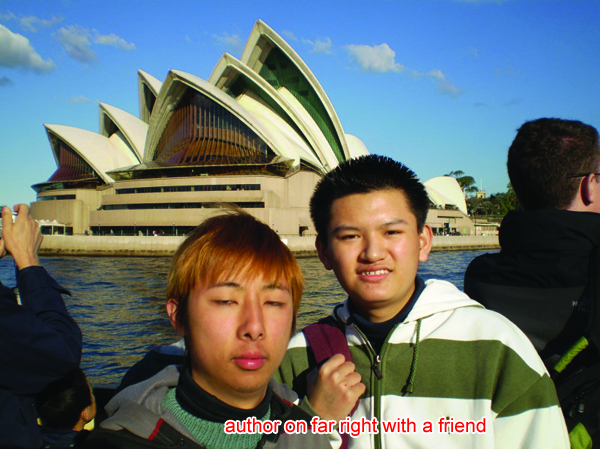
The author contrasts Christmas in Australia, where he spent his early childhood, and in the Philippines, where he grew up, before moving back 'Down Under' with his family last year.
Nothing captures the beauty of the human heart more than the season of Christmas. Its days are imbued with love, unlike ordinary days. Its theme is the joie de vivre of being part of a family. As we remember the Holy Family, which shaped us and the rest of the world, we become brothers and sisters in faith.
Countless accounts have been written about this hallowed time of the year. Each is unique in its own way, much like the manner of greeting our neighbors ‘Merry Christmas’. The words may vary – fromFeliz Navidad to Joyeux Noel to Maligayang Pasko, but the atmosphere of warmth and affection certainly does not.
It is a time of forgiveness, thanksgiving and hope. Like the story of two sisters who had not talked for a long, long time but patched up their differences at Christmas decades later, it is marked by limitlessness of possibilities. We become grateful for the coming of our Savior and wait in hope for His return. People often look forward to this time, more so in the Philippines. Filipinos love Christmas so much that they pride themselves on having the longest celebration. This usually starts around October or even as early as September and goes all the way to February.
Through a child’s eyes
My own Christmas story is exciting in its own right. Much of it stems from the fact that it spans thirteen years. I was a four-year-old kid when it all began. The tale of two Christmases starts in this very lucky country, Australia. Honestly, I don’t remember much. There are some recollections here and there, but you can’t expect too much from a four-year-old. What I do remember was that we lived in Marrickville, Sydney, in those days. The weather was hot. I was quite a talkative child. My daily routine was filled mostly with playing and fun. That meant drawing (more like scribbling), watching TV or assembling my Lego. Life was, indeed, innocent.
I vividly recall my mom putting up our large Christmas tree, a tradition that generated the season’s air in our home. She adorned it with sparkling decorations, from tiny drummers to trumpeting angels, colorful bells and candy canes to shining orbs. A kaleidoscope of lights made it seem alive with a breathtaking star to top it all off. There were also other decorations aside from the memorable tree: frame houses which featured dwarfs doing odd jobs, a humongous banner that proclaimed ‘Merry Christmas and a Happy New Year’. My elder sister, Ate Jacky, and I hung our red and green stockings on the wall to wake up the next morning with them brimming over with gifts from a generous Santa Claus.
Christmas is not nearly as popular as Easter here. The resurrection of Christ holds more significance than His birth. But for our family, deeply devout Catholics, we look forward to it anyway. During this occasion, our image as one ‘big,’ (although we were just four before), happy family could not be more pronounced. After all, it’s never too late to find heaven in each other, right?
Christmas with carabaos
In September 1994, we decided to transfer to the Philippines. Much adjustment was made, especially by me and my sister. A few months earlier, we had a vacation in that tropical country and it was definitely something different. Suddenly, the climate was hot in a way we weren’t used to. Since we settled in Legazpi City, we were surrounded by long stretches of farmland. Instead of trains and the trappings of modern society, we got used to cows, chickens and carabaos. Weird!
Our part of the country was quite laid-back, which was good: ‘Down Under’ is mostly the same. As the years passed, my Christmas stories continued. As for Santa’s gifts, I stopped receiving them when I was in third year high school. But that really didn’t pose a problem: my other joyful experiences more than made up for it.
I remember when I was nine we spent the holidays in a peaceful, faraway town of Albay. In that placid place, there lies a large lot which is home to many relatives. My Ate Jacky, my cousins and I went caroling. It was truly awesome. Once we started singing and seeing the smiles of our fine neighbors, I found meaning in the midst of the season of giving. The moment our neighbors warmed up to us, started conversing with us, I felt love for them despite their shortcomings in other areas. Spending Christmas with my relatives was also a new experience. To be together and share a meal at the table of brotherhood was memorable indeed.
I also remembered the time we attended the Simbang Gabi. Actually, not too vividly because I was still sleepy the moment we entered the church. However, the invigorating taste of puto bumbong is something that comes to mind readily. On Christmas Eve we would come together as one family to attend the Midnight Mass. Afterwards feeling restored by the Holy Spirit, we would help ourselves to my mom’s first-class cooking, the much-awaited Noche Buena. The food and camaraderie were something to remember. And what happens next made me held my breath. It was time to exchange gifts!
We would get our gifts under the tree and be pleasantly surprised each time. When I was a bit older, I came to notice the beauty of the parols and Christmas lights. Of course, nobody filled their houses and lawns with electric sights like those in Manila, yet it was still a sight to behold. I marveled at the grand spirit of Christmas in the country. People really did change for its sake. Teachers became less strict, neighbors became friendlier and there existed a feeling of unity so real you could almost touch it.
Full circle
On 10 December last year and after a lifetime basking in the islands of the Philippines, I went home at last. Two weeks later, I experienced my first Christmas here in thirteen years. I am grateful for growing up in the Philippines. It was a means by which my desire to be a great twenty-first century writer took its first steps. If there is one thing that I truly learned back there, it is to work for my own luck. Everything I ever achieved is the result of my hard work and patience. I’ll continue this quest until the sunset of my life.
And so here I am. Things have changed. I no longer reside in the same suburb, but we plan to return to the place of my childhood. Life has come full circle. My last Christmas was as good as any other. In the face of a new chapter of my life, I opened more doors by celebrating with a number of new friends. At the center of it all is a bigger, more unreal Christmastime. I watch it in a solemn hush – the air of giving and receiving, touching and accepting, speaking and listening. In my solace I find courage.
Last year, the neighborhood was a bit plain. Where were all the sights and sounds of a loud season? Were they all camouflaged in the midst of gray people? After twelve years of being accustomed to the noise, I was ‘shocked beyond repair,’ as my great mentor Sir Ed Verdadero would put it. A few houses did fill their facades and lawns with tons of Christmas lights but apparently they were in a contest for the best-lit home in our area.
I am naive about the secular world though I appear so attracted to it in the view of other people. I value more the unseen things, like faith and love, than my new pair of Reebok Pumps and my slick army jacket. To me, it is not uncommon to dish a mile-wide smile for the precious gifts I receive each and every Christmas. Deep down, I am just a humble person.
At eighteen I can, without much reflection, speak about the things I value most in life. It is not my penchant for writing honorable essays and poems, not shooting the gap in the basketball court with impunity or receiving higher learning – all that can be lost. It is being part of a legion of disciples, believing in the same blessed Being, hearing the preachers’ homilies and practicing what they preach. Above all, doing the most difficult part and growing day by day. That is, forgiving all those who have insulted me or questioned my place under the sun. It is by forgetting all the troubles my oppressors caused me. If there ever is one immortal image that I will carry as a coat of arms my entire lifetime, it is The Cross. For, if God made Man can go through all that suffering and hold not the tiniest hint of a grudge, I could do well in following His lead.
I cannot be more thankful for seeing the two sides of the coin, ‘Aussie’ and ‘Pinoy’. The journey continues for me. I know I’ll never be lost, not with the kind of pictures I paint, the words I put together. So now that it’s Christmastime, let’s give ourselves pause. And remark at the beauty of it all.
You may email Christopher Ong at toffyboy232001@yahoo.com
Bismillah (In The Name Of God)
By: Violeta Villaraiz
Violie had an article in Misyon before about her experience as an Assumption Volunteer in Cameroon. She went to Korea in April as a Columban lay missionary.
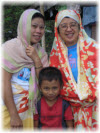
With the help of our host, Bishop Edwin de la Peña MSP of the Prelature of Marawi, his assistant, Fr Chito Suganob, and the MARADECA (Maranao People Development Center) staff, we were able to live for four days with a Maranao family in Bayabong, Butig, Lanao del Sur.
‘BISMILLAH’ – ‘in the name of God’. Yes we both were uttering God’s name. So, what is the difference? Having set foot in Marawi was for me an experience of walking on sacred ground. I felt oneness with the Maranaos, for I was given this chance to meet them in person. I also felt my being a stranger and yet welcomed by their smiles. Each time I greeted them with ‘Assalome Allaikom! - ‘Peace be with you!’ It was with the same peace of the same God we worship to be responded to with ‘Alaikom Salam!’ – ‘and so with you!’ Each time I greeted them and received a response, I really felt the connection we have for each other, that we have only one God.
‘BISMILLAH’ – ‘in the name of God’, means for the Maranaos entrusting everything to God before doing anything. I too began to utter this during our stay. I reminded myself to make the Sign of the Cross in my mind. I found myself just placing my hand gently over my heart. I experienced being part of a minority and asking myself questions about my own faith. I noticed how the family we stayed with were very faithful in their prayer – five times a day. I felt the challenge to check how I was relating with them. It wasn’t really that hard, for they and we were true to ourselves in relating to one another, respecting one another’s beliefs. We shared life, we laughed together, we talked of life, questioning and answering anything about ourselves. We even talked about politics. We were aware of the reality that we had different points of view, but we listened to one another and heard one another. The family shared with us how they were once victims of Muslim-Christian conflict, especially the all-out war of the government of President Estrada in 2000. We ate together and were overwhelmed by the family’s hospitality. We enjoyed the ride to the Malaeg River and passed by ‘Palestine’, the training camp of the MILF. Did I fear these? Of course . . . but as I had lived in Fort Bonifacio, Makati, since 1973 it was like being in the presence of the army.
Leaving behind all the biases and prejudices I carried helped me to savor the moments of each encounter, of each day of just sharing life with Muslims. And we found peace in that . . . just feeling the presence of one another, without any barriers of religion, faith or ideology. BISMILLAH!!!
‘ALHAMDULILLAH’ – ‘Salamat sa Diyos!’ - ‘Thank God!’ ‘Prejudice is the fruit of ignorance’. If we only knew the facts then we wouldn’t be biased! However, prejudice is not simply about the lack of access to the facts. Sometimes, even when we are presented with all the facts, we still refuse to accept them because we feel more secure in our prejudices. We are largely unaware (ignorant) of the historical and psychological factors that give rise to our prejudices. A session with Fr Paul Glynn SSC on prejudices and biases before going to Marawi helped me to realize the truth of what he told us, that prejudice is always unreasonable and irrational, it is never based on real experiences. And my experience in Marawi was one of sharing the dialogue of life. The only thing that mattered to me, and I’m sure to the family we stayed with, even for such a short time, wasn’t the quantity but the quality of life we shared with one another.
You may contact the author at violetavillaraiz@yahoo.com or write her at: St Columban’s Lay Missionary Center, CPO Box 1167, SEOUL 100-611, REPUBLIC OF KOREA
‘WE HAVE ONLY ONE GOD’

The Catechism of the Catholic Church, No 839, describes the Church’s relationship with the Jews in this way: ‘When she delves into her own mystery, the Church, the People of God in the New Covenant, discovers her link with the Jewish People, “the first to hear the Word of God.” The Jewish faith, unlike other non-Christian religions, is already a response to God’s revelation in the Old Covenant. To the Jews “belong the sonship, the glory, the covenants, the giving of the law, the worship, and the promises; to them belong the patriarchs, and of their race, according to the flesh, is the Christ”, “for the gifts and the call of God are irrevocable”’.
In No 841 the Catechism speaks of Islam: ‘The plan of salvation also includes those who acknowledge the Creator, in the first place amongst whom are the Muslims; these profess to hold the faith of Abraham, and together with us they adore the one, merciful God, mankind’s judge on the last day’.
Jews, Christians and Muslims all believe in one God. The Jews still await the Messiah, Muslims honor Jesus as a prophet but Christians believe that he is the Messiah, God who became Man, was crucified on Good Friday and rose from the dead on Easter Sunday. Christians believe that God is Three Persons, the Blessed Trinity, the Father, Son and Holy Spirit. Jews and Muslims do not believe that Jesus is God who became Man nor do they believe in a Trinitarian God.
As children of Abraham we believe in one God, the Creator of all. But the Christian understanding of God is very different from that of Jews and Muslims.
Christmas In Teesport
Tony McAvoy
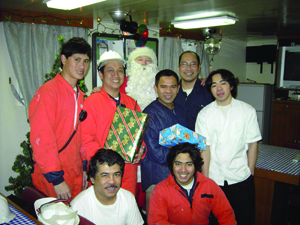
Tony McAvoy, a layman, is AOS (Apostleship of the Sea) port chaplain in Teesport, in the northeast of England. He reports on the efforts of his pastoral team to bring some Christmas cheer to seafarers. www.stellmaris.net is the website of the AOS worldwide and that of Great Britain.
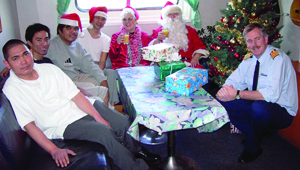
Teesport has a webpage, www.rcdhn.org.uk/general_directory/diocesan%20_societies/aos/aos1.html on the website of the Diocese of Hexham and Newcastle. The Apostleship of the Sea at Teesport, along with its ecumenical partner the Mission to Seafarers, distributed over 800 shoebox-sized Christmas presents to around 60 ships during the Christmas period. The final 25 presents were delivered to the crew of a bulk carrier which arrived in the port on 16 January 2007 after a 60-day voyage from Australia. The Filipino crewmembers were delighted. Volunteer ship visitor Don Readman played a star role as Santa Claus over the festive period. His appearance at the gangway on occasion caused grown men to shed tears of joy.
The presents were donated by parishes of different denominations, some in the immediate area of the port and others further afield but where there is good awareness of the importance of seafarers in our daily lives.
In The Service Of The People
By: Mark Ivan T. Merilo
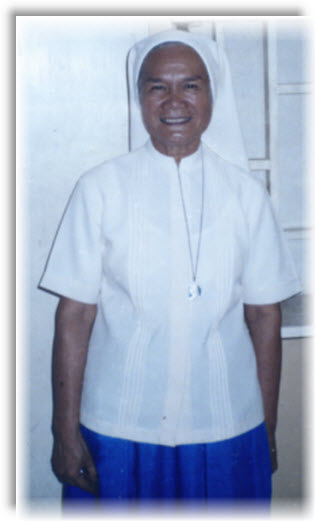 Mark Ivan Merilo is a student of Sacred Heart Seminary in Palo, Leyte. Below he shares about a Sister who inspired him to become a priest. He wrote this simple tribute as a surprise for her Silver Jubilee Celebration.
Mark Ivan Merilo is a student of Sacred Heart Seminary in Palo, Leyte. Below he shares about a Sister who inspired him to become a priest. He wrote this simple tribute as a surprise for her Silver Jubilee Celebration.
This is the story of a woman who gave me the inspiration to enter the seminary and to be like her, working in the Vineyard of the Lord. She is a woman serving the Lord unconditionally.
Sr Alicia A. Amparo OND is a member of the Society of the Oblates of Notre Dame (www.omiphil.org/ond_sisters.htm), founded in 1956 in Cotabato by then Bishop, later Archbishop, Gérard Mongeau OMI and Father, later Bishop, George E. Dion OMI. She is currently assigned to the Sacred Heart of Jesus Parish in Barrio Obrero, Davao City. Her work there is very different from that of her previous assignment when she was a teacher in Notre Dame of Abuyog in Leyte.
Humble beginnings
This beautiful and fair-skinned lady was born in Iloilo to a musically-inclined and disciplined family. She, her brothers and sisters, with their father as conductor, would perform in theaters, in fiesta parades and at parties. She was a good organist.
She was able to pursue her studies in high school and college through a scholarship program. She finished her college through her own efforts. She became a teacher in a public school and was able to support the studies of her brothers and sisters. With the help of God all her siblings were scholars too. She never abandoned her family until she ensured that her younger siblings finished their studies as her parents were unable to do so.
All those years, young Alice planned to become a nun one day. She was a scoutmaster and, as a teacher, was known as a disciplinarian so that some students were scared of her. They didn’t know that Alice had a purpose and noble intention for her disciplinary actions.
In pursuit of a dream
She was 36 when her brothers and sisters finally finished their studies and became professionals themselves. This was when she decided to become a nun and planned to join the Congregation of the Religious of the Virgin Mary (RVM), but the Blessed Virgin Mary had another plan.
Alice never gave up. She sent a letter to the Society of the Oblates of Notre Dame (OND), A Marian religious congregation in Cotabato City. When the novice mistress invited her to join the novitiate she didn’t hesitate and immediately prepared her bags. She entered the three-to-four years of formation and in 1982 at the age 43 she took her perpetual vows, leaving her family and committing herself to a new and challenging world – the world of Religious Life.
Sister Alicia became the principal of Notre Dame of Bongao in Tawi-Tawi. Later she was assigned to Notre Dame of Pikit, Cotabato, and to retreat houses and parishes, mainly in the Cotabato area. After her apostolate in the difficult and risky ministries in Mindanao she was transferred to a school in Cebu and later to Notre Dame of Abuyog in Leyte where she worked from 2004 till 2006.
Working with zeal
When she arrived in Abuyog, her first mission in Eastern Visayas, she was in charge of the canteen and handled one subject in three classes. With her two helpers, she would cook and bake the snacks for the 700 students in the morning. She would teach two classes on Mondays, Wednesdays and Fridays and one on Tuesdays and Thursdays. She always budgeted her time for prayer, study, work and rest.
This 68-year-old nun was unusual. She could be seen always early in the morning, crossing the plaza from the convent to the canteen. She came in very early and always went home late, around 7 to 8:30 in the evening. She would prepare the ice-water, pack the juice, wash the dishes and sweep the floor, all by herself. She would ask her helpers to go home ahead because they had children waiting for them.
Students always saw her in a hurry, rushing to cross the plaza and walking fast carrying the boxes of bread and casseroles at night or under the heat of the sun. Although she would be in a hurry we could see her smiling all the time, her face showing the joy, contentment and fulfillment of her life. Even if busy, she could laugh and have fun. I saw Jesus in her serving the people in every situation and condition.
Learning wisdom
One afternoon, when I was in fourth year, it was her time to teach us in Religious Education. I noticed a crowd of students in the canteen. Sister Alice had collapsed because of overwork and her heart problem. She was asked to rest. The following day she was back at work.
This November Sister Alicia will celebrate the Silver Jubilee of her perpetual vows. This ‘late vocation’ nun strives to live out the motto of her congregation, ‘That which pleases God I strive to do always’ (John 8:29).
I see in her the sincerity of her vows, most especially of the vow of poverty, in the simplicity of her life. She is very true to herself – she has the love and passion to do her work and fulfill the obligations given to her. She also observes the life of a religious nun in a life of sacrifice detached from the world and steeped in prayer. Even if she is busy I know she is praying deep in her heart while working. I can see in her eyes the wisdom, the knowledge of life. In her hands can be seen her sacrifices for her brothers and sisters, the sacrifices for the forsaken Jesus and for the People of God whom she has been serving through her 25 years of ministry. Her feet are the feet of a missionary – reaching the people in her service of the Church. Her heart is full of eagerness and joy and the fulfillment of life. Her face reflects the joy and fulfillment of her chosen vocation. I see in her the simplicity of a person very like the simple Blessed Mother Teresa of Calcutta.
You may write the author at: Sacred Heart Seminary, PALO, 6501 Leyte
Little Flame: Where Hope And Love Remain
Sr Minerva Marcelino ICM
As Christmas comes nearer I remember an experience two years ago that was painful yet meaningful and challenging. I wish to share this with you as my Christmas greetings of hope and love.
‘Akana Yesu Kavutse’ ‘The Child Jesus is born’, was our song on the eve of 15 December 2005.
Adidji
That same night, an old woman came to AKAMURI, a center for mentally handicapped children, bringing Adidji, a four-year-old boy who looked more like a two-year-old, whom we took to be her grandson. I took the boy and started to diagnose him. Like many other children I encounter here, he suffered from cerebral palsy. He couldn’t sit by himself, having some contractions in the upper and lower extremities. I started to give him a simple massage to put him at ease with me. Most of the children are afraid of me, because I am a Musungu, a foreigner, a ‘white’ person, which I’m not.
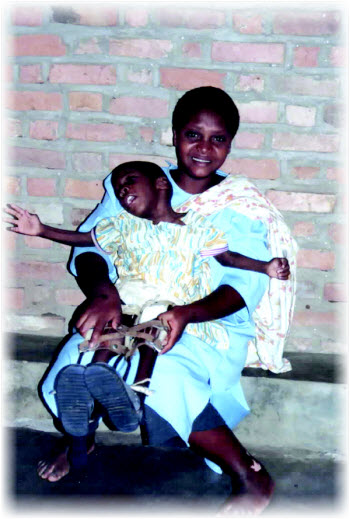
Cossette with another paraplegic child
Unwanted
He seemed different. His smile assured me that he liked the massage and mobilization. As I always do with accompanying adults, I talked with the old woman, trying to explain and demonstrate the ‘how, why and when’ of all these exercises. At the same time I was trying to learn the child’s history. To my surprise, the grandmother wasn’t listening but instead, was talking about how sick she was and in need of medicines. I got so engrossed with playing and exercising Adidji that the next time I called for his grandmother she was gone.
We searched for her, but found no trace of her. It became clear to us that she intended to leave the child at the center. There was nothing we could do but take him, a lovely child. He looked at us all with wonder and amazement. He seemed to know and understand everything but was unable to talk. Annette, one of our big slow-learner girls, cared for him for one week. In the meantime, we continued the search for his family. He had to be brought back home since the center doesn’t have the facilities or the personnel for live-in children. It is our policy and belief that the children should live with and be cared for by their families as long as the situation allows it. Keeping the relationship between the child and the family is a very important aspect of the center’s awareness program.
Special friendship
A week passed. Annette got tired of giving Adidji baths, washing his clothes, feeding him, changing his diapers – everything. She left him. Cossette picked him up. She is another slow learner who is an aide-therapist, though not in the strict sense of the word. More than anything, Adidji found love with Cossette, who not only fed him but embraced him with much love and affection, just like a real mother. Cossette herself found joy and pride in herself in caring for him. She even asked her own mother to visit Adidji. She was so proud of him and of herself.
Because of love
Adidji started to sit and eat by himself. He started to mumble some syllables such as ‘Ma’. Seeing Adidji’s improvement and Cossette being so proud of him was a real joy for us all at the center. Indeed, Akana Yesu Kavutse.
December 2005 turned to January then to February 2006 and the search for his family continued. We thought that maybe the grandmother had died. We had to try every means to find his family and our search wasn’t in vain. After three months, our mothers in the center found his family. It was a joy, the joy of seeing the longing of Adidji’s brothers and sisters to have him back home. Behind these children’s laughter and joy, our personnel noticed the sad face of the young woman whom they thought to be the mother of Adidji.
No, she was the second wife of Adidji’s father. The real mother left him and went with another man. The old woman who we thought was the grandmother was actually ‘a paid-woman’ who brings unwanted children to somebody else or simply leaves them somewhere. The father of Adidji wanted to get rid of him. We talked to the family, trying to help them to understand their responsibility. Adidji remains their child, he has the same right to love and affection and other things as much as the other children do.
Poverty is no reason to abandon him. In fact the family isn’t poor. Had they wanted to, they could even have reimbursed us for our expenses during Adidji’s three-month stay with us. We made arrangements with the family and left, assured that we had done all we could for this child.
I will never forget the sadness of Cossette one morning, almost four months later, as she told me,‘Masera Agnes, Adidji yapfuye’, ‘Sister Agnes, Adidji is dead’. I could only say, ‘Mpole shar’, ‘Sorry, my dear’.
Gone but not forgotten
The family had locked him up in a room, giving him food only once in a while. I felt so helpless, not knowing what to do. I even wanted, at a certain point, to sue them. But what’s the sense of doing that in a country where the basic needs and rights of children like Adidji are almost forgotten? Sadness, anger, anguish, regrets and frustration enveloped me. Maybe Adidji would still be alive now if we had just allowed Cossette to continue caring for him. Yes, she was his ‘little mother’, feeding him day and night, caressing him, carrying him on her back like a real Burundian mother. The joy we had in finding his family turned out to be a terrible horror. We wanted him to be there with them so he could have a fuller, normal life, as we thought. But that was not the case.
Hungry for love
Yes, it is still a long road to awareness and acceptance of responsibility. Adidji died not only of physical hunger but of hunger for love and affection, for value, acceptance and respect just like any other human being. This Christmas, I will be looking at the child Jesus in the manger and thinking of the many children in this world who are like Adidji, handicapped in so many ways.
We mourned for a life that was ‘unwanted’. Yet, I look at the sky and still see some lights. Adidji is dead but his memory remains, the memory of a life wanting to live and be loved. It is a call to hope and to believe. I felt so helpless but not too hopeless. Maybe one day there will be a difference. If it is painful for us, it must also be painful for his parents in the depths of their hearts. I want to believe, parents are parents. Adidji remained their child.
I want to continue taking the steps even if the road is so long. It will lead us where we want to go if we believe and continue walking together. If there are Papa and Mama Adidji, there are also Papa and Mama Yabo. Yabo was one of our Trisomie 21 children. She died of heart ailments three weeks before Adidji’s death. She was loved and very much cared for by the family. They did everything they could till her last breath. Beyond pain and helplessness, hope and love remain.
You may write to Sister Minerva Marcelino ICM at B.P. 425, Bujumbura, BURUNDI, Central Africa.

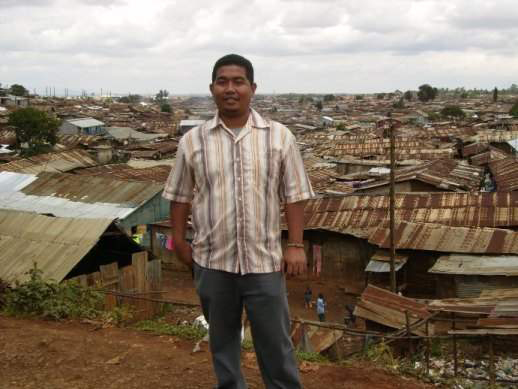
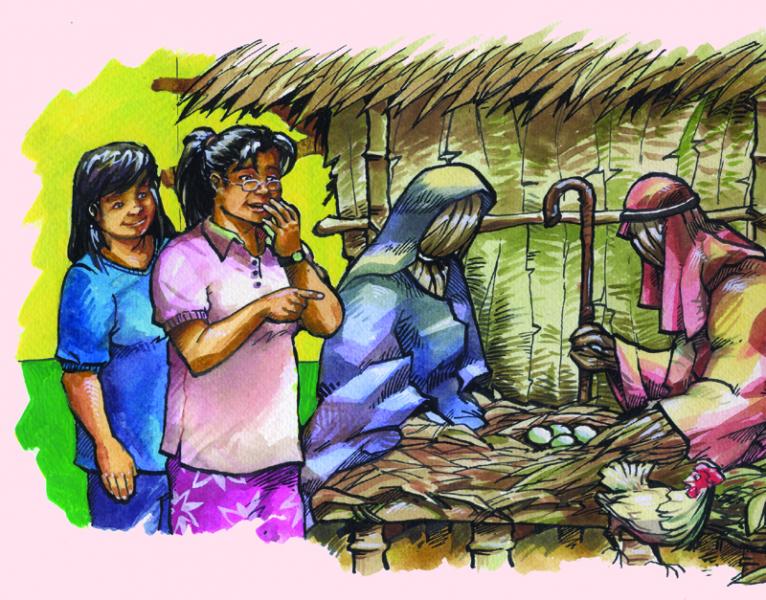
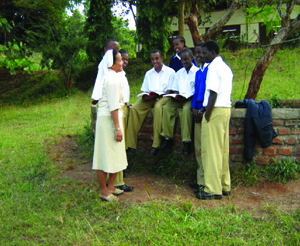
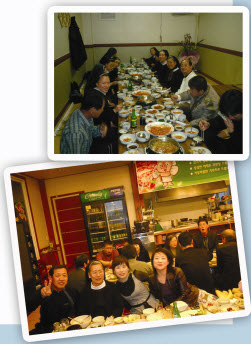 Sister Ignatius wrote in May-June about her experiences in Africa and South America. She’s now back in her native Asia, but in a country very different from the Philippines, Korea. You can learn more about the Church in Korea and the persecutions there on
Sister Ignatius wrote in May-June about her experiences in Africa and South America. She’s now back in her native Asia, but in a country very different from the Philippines, Korea. You can learn more about the Church in Korea and the persecutions there on 